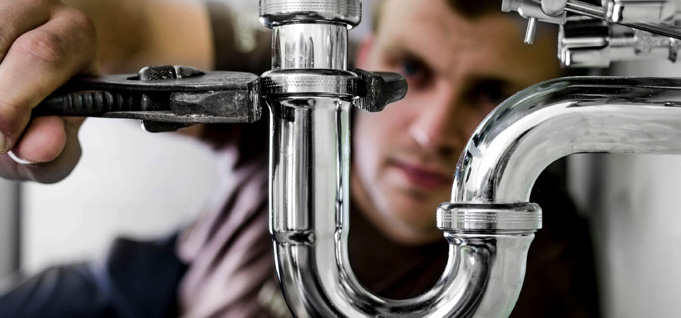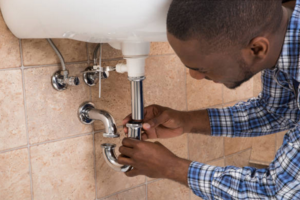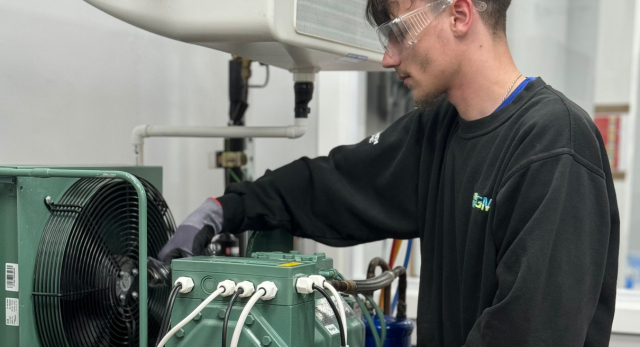Working as a plumber is a satisfying and lucrative career choice, but where do you start? This article will tell you more about the role and give you information to help you work out how to take the first steps in training.
What does a plumber do?
The job of a plumber is interesting and varied. It’s a hands-on role with a problem-solving element. Whilst working as a plumber your tasks could include:
- installing and repairing water, heating and drainage systems
- cutting shaping and joining pipes and fittings
- fitting showers, taps, toilets and baths
- responding to emergency call-outs e.g. blocked drains or burst pipes
To train as a plumber you can:
- Take course at a college or private training facility
- Take an apprenticeship
- Work towards this role in industry
- Apply directly if you’ve relevant skills
5 Reasons Why Plumbing is a Great Career
Here are 5 great reasons why plumbing may just be the best career choice out there:
- Job security – even in a downturn, people need plumbers
- Financially rewarding – plumbers are one of the highest paid contractors
- Skills for life – a portable trade, you can work anywhere
- Interesting work – a chance to use your brain as well as your hands.
- It’s sociable – you get to interact with people every day.
Is plumbing for you?
Plumbing is physically demanding work and you have to be prepared to get your hands dirty. Plumbers also need a decent knowledge of maths and science but it isn’t essential.
Should I take a plumbing training course?
The completion of a training course will help you find a position with a plumbing company. You can train at a college or a private training facility.
Logic4training has two packages available for would-be plumbers, learning and working in-centre on real-life equipment. We have several beginner packages on offer, starting with a Level 2 Diploma (the Bronze package) for which there are no entry requirements other than a good understanding of maths and English. This will equip you with all you need for an entry level job with a plumbing company.
The Silver package combines the Level 2 Diploma in the Installation & Maintenance of Plumbing and Heating Systems with a Water Regulations qualification and a practical NVQ element which takes place on a site of your choice. This course will enable you to work as a plumber on sites where a CSCS card is required.
For those who are interested in taking the role further and working as gas heating engineers, there are Gold and Platinum packages that provide theoretical and practical training in the form of a Managed Learning Programme (MLP).
An interesting job for life
Plumbing gives you the potential to be your own boss and offers a whole range of career development options. Further training gives you the choice to diversify and branch out into the heating industry including gas and heat pump technology.
If you want to stick with plumbing, in time you could work in the commercial sector, become a designer, a consultant, a manager or even a teacher and pass on your skills to the next generation.
It’s worth thinking about how you can future-proof your career and jobs that offer further options as you get older are really worth considering.
What Qualifications Do You Need To Become A Plumber In The UK?
It takes a while to become a fully trained plumber, so it’s important to do your research and make sure you choose the right training provider or college and the best route for you.
To become a plumber in the UK you’ll need to have GCSEs in Maths, English and Science at A* to C grade (or the equivalent) as a baseline requirement. However, this is the bare minimum to enter a career as a plumber. Additionally, it is worth bearing in mind that each college or employer will have their own entry requirements.
Additionally, some UK colleges may offer plumbing courses which can help you in gaining an entry-level trainee position within a plumbing company.
However, to work as a fully qualified plumber, most companies will require an industry recognised qualification, such as a Level 2 or Level 3 Diploma in Domestic Plumbing and Heating.
What’s covered by The NVQ Diplomas in plumbing?
NVQ Level 2 Diploma in Plumbing and Heating
Suitable for those who have no previous experience. This qualification provides all the basic domestic heating and plumbing training you need to build a strong foundation.
The course focuses on safe working practices and covers domestic hot and cold water systems, central heating systems, drainage and sanitation systems, and looks at environmental technologies relating to plumbing.
NVQ Level 3 Diploma in Plumbing and Heating
For those who have completed the Level 2 qualification and wish to extend their qualification, or those who already have extensive experience to build upon. It focuses on expanding technical skills and knowledge in heating as well as plumbing.
Learners work with electricity, oil-fired appliances and solar thermal hot water systems before choosing a sector in which to specialise. If you choose gas-related units at Level 3, on successful completion of the course, you can register with Gas Safe and work on gas central heating systems.
Once you’ve qualified, it’s good to register with one of the professional bodies such as the Chartered Institute of Plumbing and Heating Engineering (CIPHE), Association of Plumbing & Heating Contractors (APHC), Council of Registered Gas Installers (CORGI) or FairTrades Plumbers’ Association.
Plumbing & Heating packages from Logic4training
We offer a range of plumbing and heating packages, including a Level 2 Diploma that takes 6 weeks of in-centre training to complete and NVQ options with varied timing due to the on-site nature of the qualification.
These courses are available at Logic4training Sittingbourne and Northolt.
The best way to learn more is to attend one of our Introductory sessions.
Traineeships
For school leavers and those under 24, with general qualification below level 3 and eligible to work in England, a traineeship is a good starting point as the government pays for training and you’ll be given a work experience placement, which will prepare you for an apprenticeship. It can last up to 6 months.
To learn more about traineeships click here
Apprenticeships
If you’re not in a hurry to learn your trade, you can apply to do a Level 3 Advanced Apprenticeship to become a plumber. This usually takes between two and four years, but there are training providers that offer fast-track options too.
On a plumbing apprenticeship you will split your time between learning on the job with a qualified plumber and days in college where you learn the theory to back-up your practical knowledge. This option gives you the opportunity to earn a small wage whilst you are training. Entry requirements are usually 5 GCSE, including English and maths.
A college education
Many colleges across the UK offer 1 to 2 year courses in plumbing and this is the most common option for career changers.
If you choose to train with an independent trainer, check that the qualifications you gain in the end will allow you to become a Registered Plumbing or Heating Professional. Always make sure that the course on offer is accredited by an awarding body, which means that the training is up to professional standards.
Can I start working straight away as a plumber?
You may be able to start as a plumber’s assistant or ‘mate’ and train on the job to qualify. For this, you usually need some GCSEs, including English and maths, along with good practical skills.
Another option is to make a sideways move into plumbing if you’ve got qualifications and several years’ experience in a related trade, like building services or heating and ventilation engineering.
Before you can start work on a construction site, you will require a CSCS card which proves you have the appropriate qualifications for the job you are working on.
For more information on our training courses, or to discuss other options, please get in touch with us. Or click here to learn more about our entry-level plumbing and heating courses.











